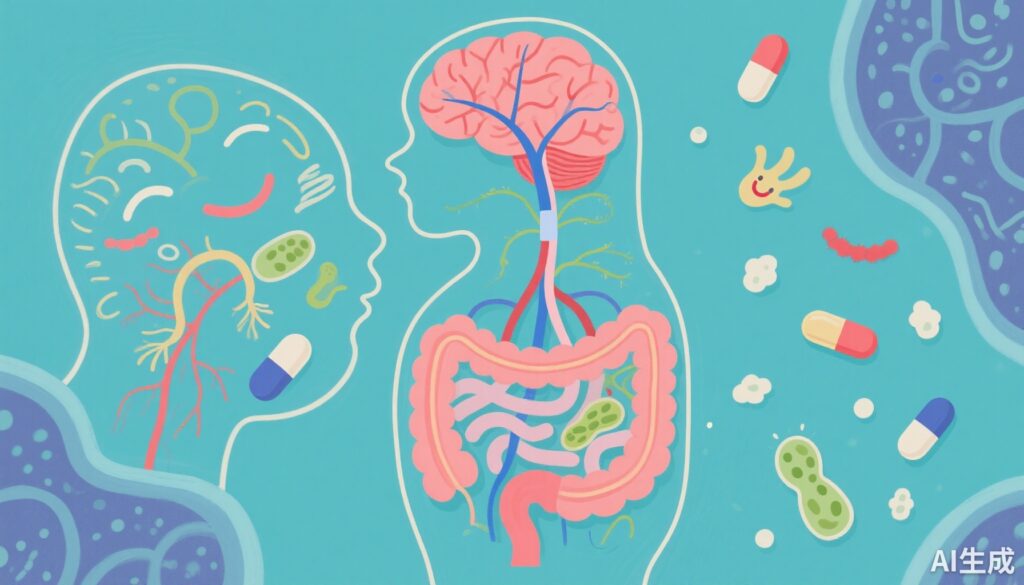Highlight
- Multi-species probiotic (OMNi-BiOTiC® STRESS Repair) significantly enhances vagal nerve function in patients with major depression after 3 months.
- Probiotic supplementation correlates with increased abundance of beneficial gut bacteria, especially Akkermansia muciniphila.
- Improved vagal tone associates with better sleep quality, including reduced sleep medication use and shorter sleep latency.
- This study elucidates a potential mechanistic link between probiotics and antidepressant effects mediated via the gut-brain axis.
Study Background and Disease Burden
Major depression (MD) is a prevalent and debilitating psychiatric disorder characterized by persistent low mood, cognitive disturbances, and impaired psychosocial functioning. It poses a substantial individual and societal burden including increased morbidity, mortality, healthcare costs, and lost productivity worldwide. Despite advances in pharmacotherapy and psychotherapy, a significant proportion of patients remain treatment-resistant or suffer from side effects, prompting exploration of novel adjunctive interventions.
The gut-brain axis represents a bidirectional communication system linking the central nervous system with the gastrointestinal tract, involving neuroimmune, neuroendocrine, and microbial interactions. The vagus nerve (VN) is a central conduit facilitating parasympathetic regulation and afferent signaling within this axis. Emerging evidence links vagal nerve dysfunction to depressive symptoms and inflammation.
Probiotics have garnered attention for their potential psychotropic effects by modulating gut microbial composition and systemic physiology. Meta-analyses suggest antidepressant benefits, yet the underlying neurobiological mechanisms remain insufficiently defined. Understanding how probiotics influence the vagus nerve and related physiological parameters could unlock new therapeutic strategies for MD.
Study Design
This randomized, double-blind, placebo-controlled trial enrolled 86 participants comprising 43 patients diagnosed with major depression and 43 age- and sex-matched healthy controls (HC). Subjects were randomized to receive either the multi-species probiotic supplement OMNi-BiOTiC® STRESS Repair or placebo twice daily for a duration of three months.
Key assessments were conducted at baseline, 7 days, 28 days, and 3 months, including:
– Collection of serum and stool samples for biomarker and microbiome analyses.
– Evaluation of vagal nerve function via 24-hour electrocardiography (ECG) measuring heart rate variability (HRV), a validated index of autonomic regulation.
– Analysis of stool microbiota composition utilizing 16S rRNA sequencing.
– Sleep quality measured by the Pittsburgh Sleep Quality Inventory (PSQI), focusing on parameters such as sleep latency and use of sleep medications.
Key Findings
After three months of treatment, patients with major depression who received the probiotic supplement demonstrated a significant enhancement in morning vagal nerve function as assessed by HRV metrics, compared both to their baseline status and to probiotic-treated healthy controls. This indicates a targeted normalization of autonomic imbalance often present in depression.
Microbiome analyses revealed a marked increase in the abundance of bacterial taxa associated with health-promoting effects, particularly the order Christensenellales and the species Akkermansia muciniphila in the probiotic-treated MD group. Akkermansia muciniphila has been implicated in mucosal integrity, anti-inflammatory functions, and metabolic benefits.
Clinically relevant improvements in sleep parameters were recorded among the MD probiotic group, evidenced by decreased use of sleep medications and reduced sleep latency scores per PSQI data. Improved sleep is critical in depressive illness management and quality of life enhancement.
Safety assessments showed no serious adverse events attributable to the probiotic intervention, underscoring its favorable tolerability profile.
Expert Commentary
This pioneering trial strengthens the hypothesis that probiotics can beneficially modulate neurophysiological pathways implicated in depression by enhancing vagal nerve tone. The vagus nerve, through its autonomic and anti-inflammatory influences, may represent a critical mediator bridging gut microbial composition and central nervous system function.
The significant increase in Akkermansia muciniphila aligns with emerging research on its role in metabolic regulation and gut barrier maintenance, which might indirectly influence neuroimmune signaling. Improved sleep quality suggests downstream psychosomatic benefits accompanying VN modulation.
Although promising, the study has limitations including a relatively moderate sample size, which may affect the generalizability of findings. Further trials with larger cohorts and longer follow-up are warranted to confirm sustained clinical outcomes and explore causality.
The findings invite integration of microbiome-targeted therapies alongside conventional antidepressants, potentially revolutionizing personalized treatment paradigms for depression.
Conclusion
This rigorous randomized controlled trial provides high-quality evidence that a multi-species probiotic supplement can significantly enhance vagal nerve function in patients with major depression. Coupled with favorable alterations in gut microbiota—specifically increased Christensenellales and Akkermansia muciniphila—and improved sleep quality, these results highlight probiotics as a novel and well-tolerated adjunctive strategy for managing MD.
By elucidating a plausible mechanistic link between the gut microbiome and brain function via the vagus nerve, these findings open avenues for targeted biologic interventions aimed at restoring autonomic balance and mitigating depressive symptoms. Future research should establish long-term efficacy, optimal formulations, and dosing regimens to fully translate these insights into clinical practice.



